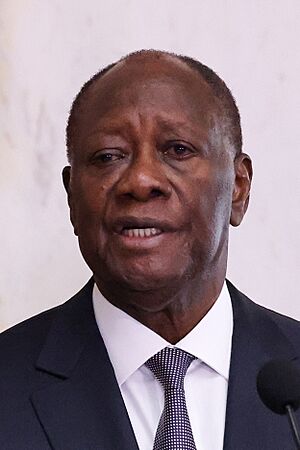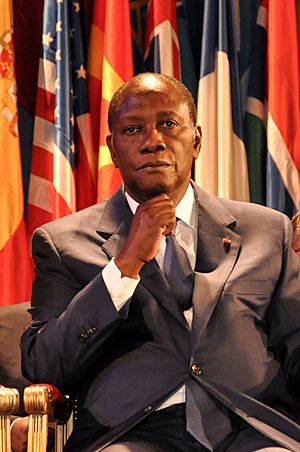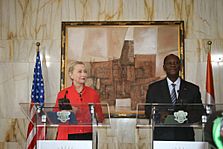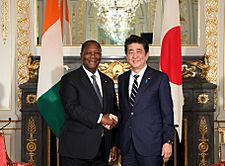Alassane Ouattara facts for kids
Quick facts for kids
Alassane Ouattara
|
|
|---|---|

Ouattara in 2024
|
|
| 5th President of Ivory Coast | |
| Assumed office 4 December 2010 |
|
| Prime Minister | Guillaume Soro Jeannot Ahoussou-Kouadio Daniel Kablan Duncan Amadou Gon Coulibaly Hamed Bakayoko Patrick Achi Robert Beugré Mambé |
| Vice President | Daniel Kablan Duncan Tiémoko Meyliet Koné |
| Preceded by | Laurent Gbagbo |
| 2nd Prime Minister of the Ivory Coast | |
| In office 7 November 1990 – 9 December 1993 |
|
| President | Félix Houphouët-Boigny |
| Preceded by | Félix Houphouët-Boigny |
| Succeeded by | Daniel Kablan Duncan |
| 24th Minister of the Economy and Finance | |
| In office October 1990 – November 1993 |
|
| 30th Deputy Director General of the International Monetary Fund | |
| In office 1994–1999 |
|
| 25th Governor of the Central Bank of West African States | |
| In office December 1988 – November 1990 |
|
| Preceded by | Abdoulaye Fadiga |
| Succeeded by | Charles Konan Banny |
| Personal details | |
| Born | 1 January 1942 Dimbokro, Ivory Coast |
| Political party | Democratic Party (Before 1994) Rally of the Republicans (1994–present) |
| Spouses |
Barbara Jean Davis
(m. 1966, divorced)Dominique Nouvian
(m. 1991) |
| Children | 2 |
| Relatives | Téné Birahima Ouattara (brother) |
| Alma mater | Drexel University (BS) University of Pennsylvania (MA, PhD) |
| Website | Official Presidential website: https://www.presidence.ci/ |
Alassane Dramane Ouattara, born on January 1, 1942, is a politician and economist from Ivory Coast (also known as Côte d'Ivoire). He has been the President of Ivory Coast since 2010. Before becoming president, he worked as an economist for important financial organizations. He also served as the Prime Minister of Côte d'Ivoire from 1990 to 1993. In 1999, he became the leader of an Ivorian political party called the Rally of the Republicans (RDR).
Contents
Early Life and Family
Alassane Ouattara was born in Dimbokro, Ivory Coast, on January 1, 1942. His family background connects him to the Muslim rulers of Burkina Faso, which was once part of the Kong Empire. He is a Muslim and belongs to the Dyula people.
He studied in the United States, earning a Bachelor of Science degree in 1965 from the Drexel Institute of Technology (now Drexel University) in Philadelphia. He then continued his studies at the University of Pennsylvania, where he received a master's degree in economics in 1967 and a Ph.D. in economics in 1972.
Ouattara has two children, David Dramane Ouattara and Fanta Catherine Ouattara, from his first marriage to Barbara Jean Davis. In 1991, he married Dominique Nouvian, a businesswoman from France.
Career in Finance
Ouattara began his career as an economist for the International Monetary Fund (IMF) in Washington, D.C., from 1968 to 1973. The IMF is an international organization that helps countries with their economies.
After that, he worked for the West African Central Bank (Banque Centrale des Etats de l’Afrique de l’Ouest, BCEAO) in Paris from 1973 to 1975. He held several important roles at the BCEAO, including Special Advisor to the Governor and Director of Research. From 1983 to 1984, he was the Vice Governor.
From 1984 to 1988, he was the Director of the African Department at the IMF. In 1987, he also became an advisor to the Managing Director at the IMF. On October 28, 1988, he was appointed as the Governor of the BCEAO. He is known for being a hard worker who believes in honesty and good management.
Political Journey
Becoming Prime Minister
In April 1990, the IMF suggested that the Ivorian president, Félix Houphouët-Boigny, appoint Ouattara to lead a committee for economic recovery. Ouattara took on this role while still serving as BCEAO Governor.
He then became the Prime Minister of Côte d'Ivoire on November 7, 1990. At this time, Charles Konan Banny took over as the interim BCEAO Governor. Ouattara also served as the Minister of Economy and Finance from October 1990 to November 1993.
During his time as prime minister, Ouattara also took on some presidential duties for about 18 months, especially when President Houphouët-Boigny was ill. When President Houphouët-Boigny passed away on December 7, 1993, Ouattara announced the news to the country. A short disagreement followed between Ouattara and Henri Konan Bédié, the president of the National Assembly, about who should become president next. Bédié eventually became president, and Ouattara resigned as prime minister on December 9. After this, Ouattara returned to the IMF, working as Deputy Managing Director from 1994 to 1999.
The 1995 Election
Before the presidential election in October 1995, a new election rule was passed. This rule said that candidates could not run if either of their parents were from another country or if they had not lived in Ivory Coast for the past five years. Many people believed this rule was made to prevent Ouattara from running. Because of his work with the IMF, he had not lived in Ivory Coast since 1990, and his father was born in Burkina Faso.
The Rally of the Republicans (RDR) party wanted Ouattara to be their candidate. However, because of the new rule, Ouattara decided not to run. The RDR, along with another party, the Ivorian Popular Front (FPI), decided not to take part in the election. This meant that the current president, Henri Konan Bédié, won easily.
Leading the RDR Party
While still working at the IMF, Ouattara shared his plans to return to Ivory Coast and get involved in politics again in March 1998. After leaving the IMF in July 1999, he was chosen as the President of the RDR party on August 1, 1999. He was also selected as their candidate for the next presidential election. He stated that he was eligible to run, showing documents that he said proved he and his parents were born in Ivory Coast.
However, some people questioned his nationality. President Bédié said that Ouattara was from Burkina Faso. In October 1999, a court canceled Ouattara's nationality certificate. An arrest warrant was issued for him in November, but he was not in the country at the time.
On December 24, 1999, the military took control of the country and removed President Bédié from power. Ouattara returned to Ivory Coast on December 29, saying that this change was "a revolution supported by all the Ivorian people."
A new constitution was approved in July 2000. This new rule said that presidential candidates must have both parents born in Ivory Coast. Because of this, Ouattara was not allowed to run in the 2000 presidential election. These issues about his nationality were a big reason for the First Ivorian Civil War, which started in 2002.
In 2007, President Gbagbo confirmed that Ouattara could run in the next presidential election. Ouattara was officially chosen as the RDR's presidential candidate in February 2008. He was also re-elected as the RDR's president for another five years.
The 2010 Presidential Election

The presidential elections, which were supposed to happen in 2005, were delayed until November 2010. Early results showed that Alassane Ouattara had won against the current president, Laurent Gbagbo.
However, Gbagbo's party disagreed with these results, saying there was a lot of fraud. The Constitutional Council, which had supporters of Gbagbo, then announced that Gbagbo had won the election. But most countries and the United Nations recognized Ouattara as the winner. This led to a serious political disagreement and some violence. People worried that the country might go back into civil war, and many refugees left.
The African Union tried to help solve the problem. The United Nations Security Council also recognized Alassane Ouattara as the winner. The Economic Community of West African States and the African Union suspended Ivory Coast from their groups because of the situation.

The 2010 election led to a difficult period for Ivory Coast, sometimes called the 2010–2011 Ivorian crisis or the Second Ivorian Civil War. Sadly, many lives were lost during this time. In April 2011, Laurent Gbagbo was taken into custody. The country was badly affected by the conflict, and rebuilding the economy and uniting the people became a big challenge for Ouattara.
Many world leaders welcomed the end of the crisis. U.S. President Barack Obama praised the developments, and U.S. Secretary of State Hillary Clinton said that Gbagbo's capture sent a clear message to leaders who ignore their people.
Marriage Law Discussion in 2012
In November 2012, President Ouattara made a surprising decision to change his government. This happened because of a disagreement over a new marriage law. The proposed law would have made wives joint heads of the household. While Ouattara's own party supported these changes, other parts of the ruling group, especially the Democratic Party of Côte d'Ivoire, were against it.
Second Term: 2015–2020

Ouattara won his second five-year term as president in 2015 with a large number of votes, almost 84%. This was a clear victory, as he needed only 50% to win without a second round of voting. His closest opponent received only 9% of the votes.
In September 2017, during a meeting of the RDR party, it was expected that Ouattara would be re-elected as the party's president. However, he suggested Henriette Diabaté for the position instead, and she was chosen.
In March 2020, Ouattara announced that he would not run for president again in the election scheduled for October 31, 2020. He supported Prime Minister Amadou Gon Coulibaly as the RDR's candidate. However, after Coulibaly's sudden death in July 2020, Ouattara decided to run for a third term. This decision was debated because the Ivorian constitution usually limits presidents to two terms. The Constitutional Court ruled that his first term, which was under a different constitution, did not count towards the two-term limit of the current constitution. This ruling allowed him to run again, but it also led to protests in the country. The election in October 2020 was boycotted by many opposition groups. Alassane Ouattara was re-elected with 95.31% of the votes.
In 2025, Ouattara was again chosen by his party to run for re-election in the 2025 Ivorian presidential election.
Awards and Honors
From Ivory Coast
From Other Countries
 Burkina Faso:
Burkina Faso:  Grand Cross of the Ordre de l'Étalon (July 31, 2019)
Grand Cross of the Ordre de l'Étalon (July 31, 2019) Ghana:
Ghana:  Companion of the Order of the Star of Ghana (October 16, 2017)
Companion of the Order of the Star of Ghana (October 16, 2017) Mali:
Mali:  Grand Cross of the National Order of Mali (September 3, 2013)
Grand Cross of the National Order of Mali (September 3, 2013) Niger:
Niger:  Grand Cross of the National Order of Niger
Grand Cross of the National Order of Niger Liberia:
Liberia:  Grand Cordon of the Order of the Pioneers of Liberia
Grand Cordon of the Order of the Pioneers of Liberia Portugal:
Portugal:  Grand Collar of the Order of Prince Henry (September 12, 2017)
Grand Collar of the Order of Prince Henry (September 12, 2017) Togo:
Togo:  Grand Cross of the Order of Mono
Grand Cross of the Order of Mono Senegal:
Senegal:  Grand Cross of the National Order of the Lion (November 11, 2023)
Grand Cross of the National Order of the Lion (November 11, 2023) Sierra Leone:
Sierra Leone:  Honorary Grand Commander of the Order of the Republic (July 31, 2017)
Honorary Grand Commander of the Order of the Republic (July 31, 2017) South Africa:
South Africa:  Member of Order of South Africa (July 22, 2022)
Member of Order of South Africa (July 22, 2022)
See also
 In Spanish: Alassane Ouattara para niños
In Spanish: Alassane Ouattara para niños
 | James Van Der Zee |
 | Alma Thomas |
 | Ellis Wilson |
 | Margaret Taylor-Burroughs |

